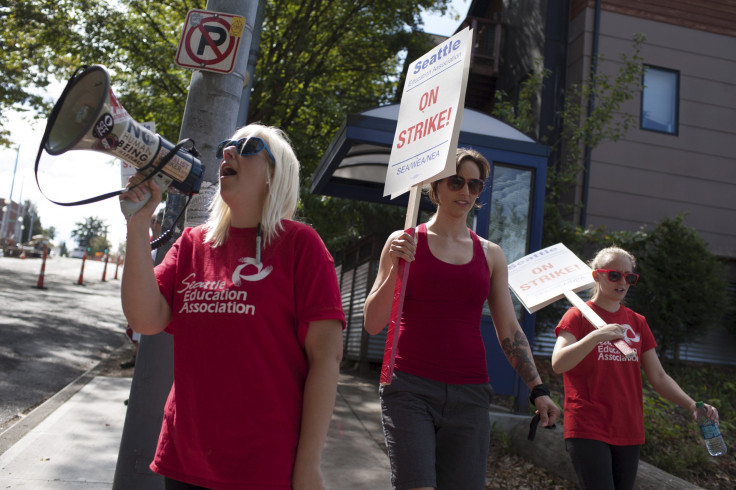Drawing Attention To Nationwide Debates Over Public Education, Seattle Teachers Strike Rolls On For Second Week

Seattle students will have to wait a little longer for the school year to begin. Officials from the teachers union and school board failed to reach an agreement over the weekend, sending 5,000 teachers and support staff back to the picket lines this week. When they hit the pavement on Monday, it became their fourth day on strike.
Handing an extended summer break to 50,000 students, the dispute brings into sharp relief some of the most contentious issues facing public school teachers nationwide: questions about compensation, length of school days, teacher evaluations and high-stakes student tests.
Ties between the latter two have sparked controversy across the country, but they’ve triggered especially strong backlash in Seattle. Last spring, high school juniors at a number of city schools decided to opt out of mandatory tests, with one school boycotting them entirely. The teachers union, the Seattle Education Association, says it wants to stop tying evaluations to test scores.
Teachers also complain they haven’t received a cost-of-living increase in six years, even as housing costs surge in the wake of the city’s lucrative tech boom. The median price of a single-family home in King County is $500,000, up more than 10 percent over the last year, the Seattle Times reported in June. Meanwhile, teachers’ salaries range from about $44,000 to more than $86,000 for those with more experience and advanced degrees.
On Sunday, the union announced it had put forth a two-year proposal asking for a 4.75 percent annual pay raise the first year, and 5 percent increase the second year. That marks a steep retreat from 21 percent over three years pay raise teachers initially sought.
But the union said a proposal from Seattle Public Schools -- which included a 14 percent pay raise over three years -- was "not good enough.” That latest offer, which would raise teacher salaries to $51,881 for starting teachers to $99,762 for veterans, also included a proposal to extend the school day by 20 minutes, with added compensation. The district says Seattle teachers have one of the shortest school days in the state, at six hours and 10 minutes.
Seattle Educators on Strike!: Walking the picket line, day one http://t.co/Sol0rGHGUZ pic.twitter.com/Og24TMa5JX
— Jesse Hagopian (@JessedHagopian) September 10, 2015Looming over the pay disagreement is Washington state's battles over funding for public education. The state has no income tax and requires voters to approve special levies for education. Although the state Supreme Court found that system to be unconstitutional in 2012, the legislature has yet to come up with an alternative. Teachers unions and their allies complain the entire system is chronically underfunded.
The dispute marks the first teachers strike in Seattle since 1985. At that time, the 19-day work stoppage, over class size and pay for extra days worked, among other things, ended thanks to an intervention from the governor. The last major American city to see a teachers’ strike was Chicago, when nearly 30,000 educators walked out for a week and a half at the beginning of the 2012 school year.
Like the Chicago strike, the showdown in Seattle has become something of a proxy for national debates over the future of funding for public education -- and the role of unions within that system. Labor advocates have framed the fight as one over the long-term sustainability of public education: “We’re tired of being disrespected, and we’re tired of seeing a district with enough resources, willfully withhold those resources and refuse to create a school system that our students deserve,” union activist Jesse Hagopian told In These Times magazine. “I’ll go back to work when they start respecting students and teachers.”
Critics, meanwhile, have blamed teachers for being greedy at the expense of students and their families.
© Copyright IBTimes 2025. All rights reserved.






















